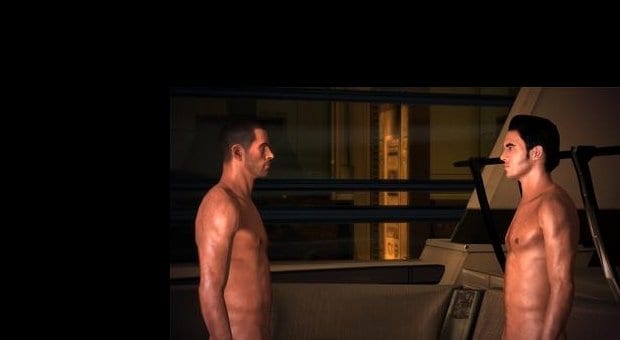For fans of the popular video game Mass Effect, the recently announced third episode brings a welcome development for lead character Commander Shepard.
Previously in the Mass Effect series players could choose to play as either a male or female Shepard but could court only characters of opposite genders. There was no option for a gay male Shepard. But with the third game, executive producer Casey D Hudson revealed via Twitter that there would be “wider options for love interests,” such as same-sex relationships.
Blog GayGamer broke the news, which soon spread to mainstream games sites like Kotaku, Joystiq, Destructoid and 1UP. Media and fan reception has been positive, especially after the disappointment that same-sex pairings weren’t available in Mass Effect 2.
The Mass Effect series is highly popular: the second game was one of the top sellers of 2010 and earned four Canadian Video Game Awards, including game of the year. It featured the voice talents of Hollywood stars Martin Sheen, Tricia Helfer and Carrie-Anne Moss. For Bioware, the Edmonton-based developer of the series, exploring queer relationships isn’t novel; its Dragon Age series has similar options. But the company skirted the issue until now with its flagship Mass Effect series, branding it as a PG-13 action game.
Bioware isn’t the only company bringing gay character and storyline options to video games. Recently Lionhead studios, in its blockbuster title Fable III, a fantasy epic for the Xbox 360, included same-sex relationships and even the option to adopt children. What games like Mass Effect, Dragon Age and Fable have in common is a focus on narrative, and the increased equality is an attempt to better engage players in the story by more accurately reflecting the game-playing population.
As the head of Lionhead, Peter Molyneux, told the website AfterEllen, “If you want to make your world close to the world we live in, a rich and interesting place, then why wouldn’t you do something like this?”
The choice to make games more inclusive broadens the reach and appeal of games but doesn’t come without controversy. The issue drew attention in March when a senior Bioware employee clashed with a player who, in a post on the official Dragon Age II forum, asserted that the developer neglected its “main demographic” of straight male players by including a range of romantic options and lamented the inability to turn off queer interactions entirely in the game.
David Gaider, lead writer of the game, retorted that “the romances in the game are not for ‘the straight male gamer.’ They’re for everyone. We have a lot of fans, many of whom are neither straight nor male, and they deserve no less attention.” He then criticized the player for assuming that he spoke on behalf of all straight males and questioned how equality could take away from anything: “If there is any doubt why such an opinion might be met with hostility, it has to do with privilege. You can write it off as ‘political correctness’ if you wish, but the truth is that privilege always lies with the majority. They’re so used to being catered to that they see the lack of catering as an imbalance.”
The negative reaction to gay characters in games isn’t surprising, says Melanie McBride, an educator and games researcher at Ryerson University in Toronto. She says most commercial games “reinforce dominant hegemonic power relations.” She adds that more game developers must acknowledge the imbalance in games that can be “intentionally alienating and intentionally non-inclusive” and that gamers should be more vocal about inclusion.
Arguably, more than in any other medium, game developers are receptive to player suggestions: for example, Molyneux added same-sex options into the Fable sequels as a response to requests from queer players.
The magic of games is the freedom of choice. In the end, queer gamers don’t necessarily have to play as such in a game, but by handing over the decision to all players a game is all the better for it.


 Why you can trust Xtra
Why you can trust Xtra


